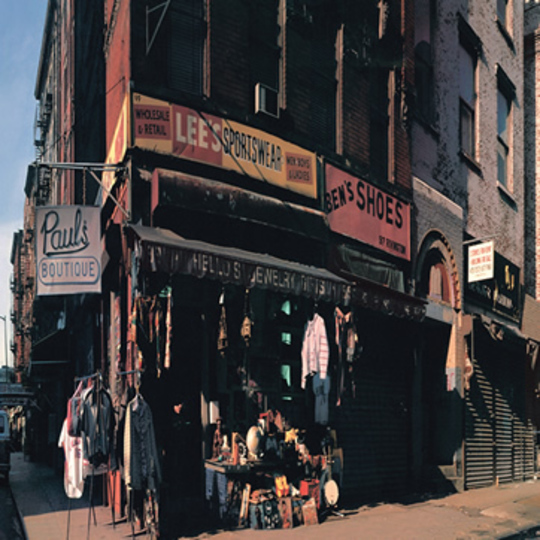
Beastie Boys
Paul's Boutique (20th Anniversary Edition)
(Capitol; 1988/2009)
By Clayton Purdom | 24 February 2009
A Series of Half-Mentioned Things I Can’t Possibly Explicate Fully, In Light of the 20th Anniversary Re-Release of Paul’s Boutique, My Second Favorite Record of All Time
It’s best that we discuss these things up front: this will be horribly inadequate. I don’t have the right stuff for this—don’t have the energy, the breath, or the breadth; have listened, perhaps, even after about ten years, too few times to this record, this mythological thing both Pangaea and Atlantis of rap and its forebears, redolent of all types of genius but mostly just the stupid kind, the kind I’ve made my own.
I’m not genius; certainly, not like Paul’s Boutique is genius. But also not that I’m not, who knows. Not that you’re not. There could still within me (or you) lurk something like this, and that’s part of the whole goddamn thing. Paul’s Boutique seems to exist entirely outside of the discography of the clowns that made Licensed to Ill (1986), bearing with it none of the sonic, geographic, or emotional residue of its brutish predecessor. It’s an NYC record—harsh, brisk, hyperventilating—made of West coast sunlight. It doesn’t make a lick of sense. The serviceability and occasional brilliance of its antecedents have nothing in common with this compressed blast of invention—not even also-great Check Your Head (1992), which forgot the East Coast cold entirely for a permanent half-baked afternoon and in so doing seemed, somehow, a lot more human, approachable, and finite. That red-eyed comedown was its own triumph. But how much of the triumph of that landing is based on this height from which it fell?
It’d be easy to lay the honor for Paul’s Boutique on the Dust Brothers’ production, which as you probably understand and as I won’t get into here remains an encyclopedia on the ways samples can be used in pop music. As you understand and as I won’t get into here it predicted (if not outright influenced—I’m not supposing) the way most interesting music would sound in the coming, well, 20 years and counting. You know: Odelay (1995), Enter the 36 Chambers (1993), Since I Left You (2000), Beauty and the Beat (2005), who’s next. Those happened because these beats happened. But giving all due honor to the Dust Brothers would be a smallsighted gesture; Paul’s Boutique exists outside of the Dust Brothers, too. It exists outside of the production. It exists outside of every aspect of its human creators, a testament to the sort of greater human thought processes that occur without being thought of at all—like two people arriving at the same funny joke at the same time, as if either should get full credit. The joke was funny, existed the whole time, and was pulled from the ether by two hands at once. Only, this time, by five hands (3 Boys + 2 Brothers). Plus whoever else.
Plus the Beatles. Plus Donovan. Plus the Eagles and Afrika Bambaata and my high school English teacher and epistemological father figure Mr. Ballor, to whom I loaned this record while heavy in the five or so years during my life I equated myself with the Beastie Boys with the same zealous unhinged fervor that they themselves seemed to equate with popular thought in general and pop music in particular. On Paul’s Boutique, everything was theirs to know and take for their own, and everything was funny as fuck. Mr. Ballor liked it. And all of us giggling: how come I’m not this? How come they’re not rapping over Bernard Hermann? Here, listen to them do it. How come they can’t jettison some old inside joke about egging a bouncer—a story already previously transmuted into song form, only then as a screechy godfuckingawful punk song back when these same fleetingly omniscient decade-slayers were in a screechy godfuckingawful punk band, also sadly called the Beastie Boys—and then take that story and flip it into whatever adjectives we want to use to describe the track “Egg Man”? Here’s a couple: fly, great, genius, so on. There are more.
Fucking adjectives, man. Let’s not even get into it. Let’s leave this pie half-baked, these thoughts half-formed. Picking apart Paul’s Boutique in a review—“criticizing” it!—is like conclusively answering the question “How are you doing?” We answer “fine” or “good” or “tired” and move on. As if I could possibly explain this record’s importance to music or myself—as if I possibly knew. In that art seems to me the only earthly proof of the existence of God, somehow this diamond compression of twentieth century music, riddled to powdery oblivion with punchline idiocy, seems to me a clear conduit into the human capacity for the infinite. Don’t ask me what I mean by that. Don’t ask me how I can say I like Aquemini more. Don’t ask me anything.
Listen to these fucking assholes go.





